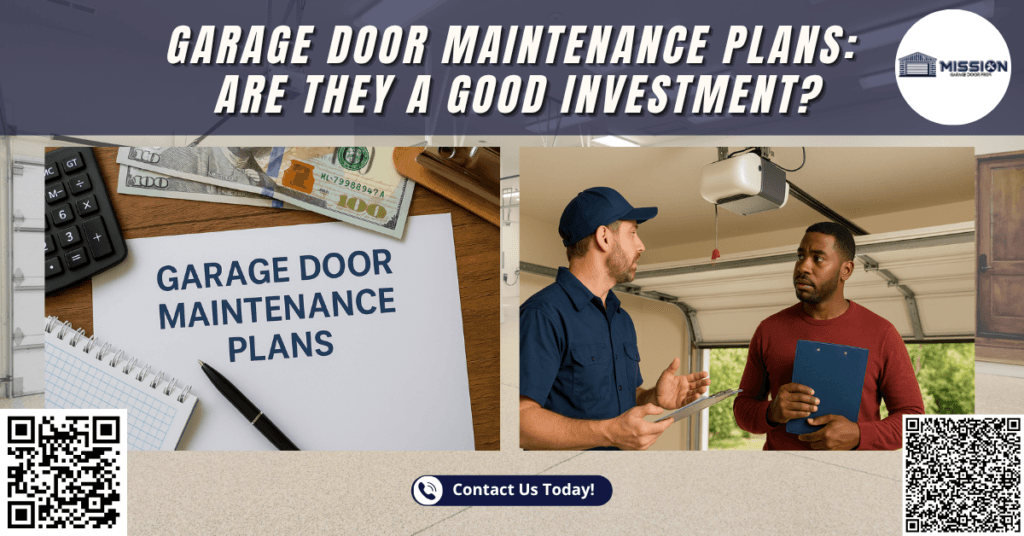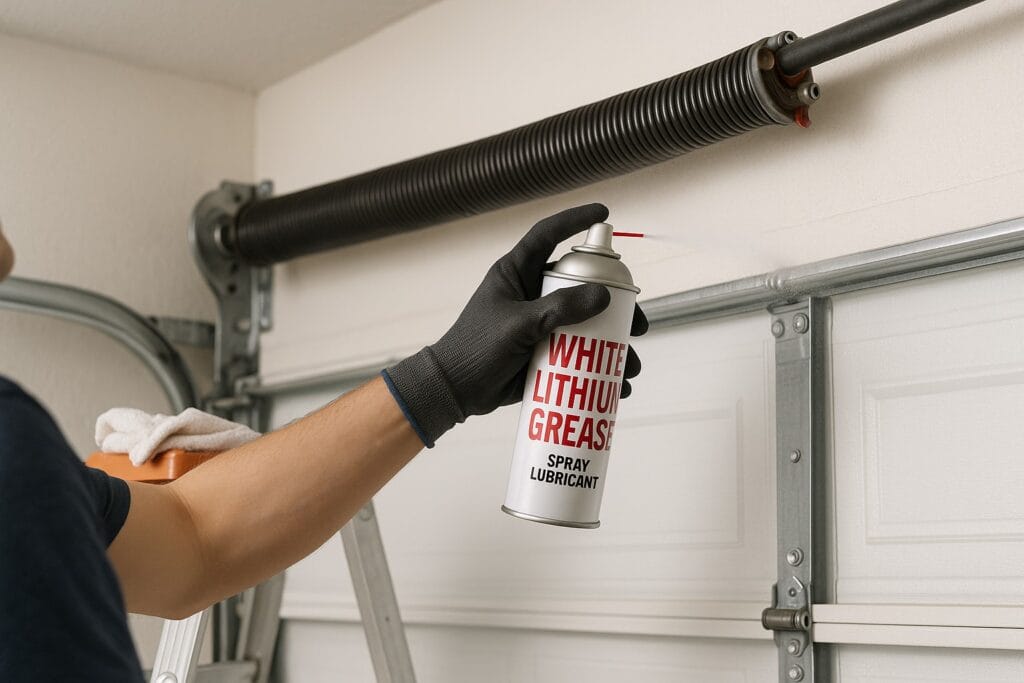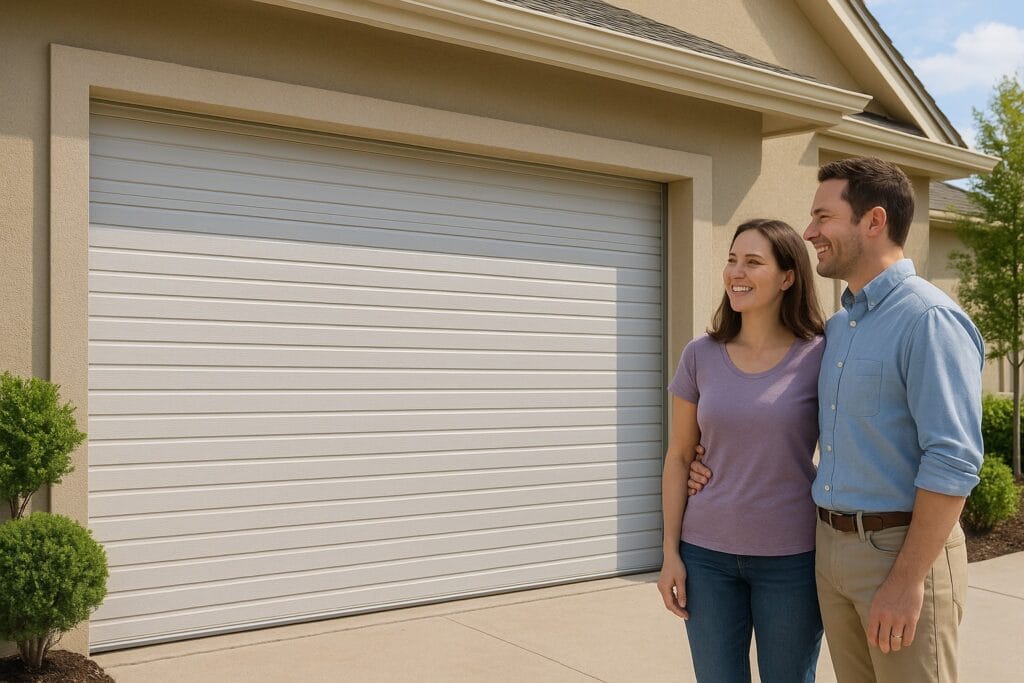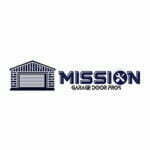Garage Door Maintenance Plans: Are They a Good Investment?

Imagine it’s Monday morning. You’re rushing out the door to take your kids to school or get to work on time. You press the garage door opener, expecting to hear the quiet hum of the motor and see the door lift smoothly. Instead, there’s a loud bang, followed by silence. The door won’t open. It happened to one of our customers in Mission, TX, just last year. The cause? Neglected torsion springs and rollers are worn down after years of use without maintenance. That emergency repair cost them several hundred dollars, not to mention the stress of rescheduling their day.
Garage doors are the largest moving parts of most homes and play a crucial role in home security, energy efficiency, and convenience. According to national data, garage doors open and close more than 1,500 times a year, which is over four times a day. With that kind of usage, it’s no wonder that regular maintenance is essential. Whether you have steel garage doors, wood doors, or insulated panels, a little preventative care goes a long way in protecting your investment.
At Mission Garage Door Pros, we believe in helping families and businesses in Mission, TX, and surrounding areas keep their garage door systems in top shape through proactive and affordable maintenance plans. In this guide, we’ll explore what garage door maintenance is, what it involves, and why investing in a plan is one of the smartest decisions you can make for your home or commercial property.
What Is a Garage Door Maintenance Plan?
A garage door maintenance plan is a service agreement where professional technicians inspect, lubricate, and tune up your garage door system on a scheduled basis. This is a form of preventative maintenance that helps avoid costly repairs and ensures smooth operation over time.
These plans are not one-size-fits-all. They are tailored to your garage door’s type, usage level, and environment. Whether you have a single residential door or multiple commercial roll-up garage doors, a good maintenance plan will:
- Inspect and lubricate moving parts like rollers, tracks, and hinges
- Test and balance torsion springs and extension springs
- Adjust the door opener settings and safety sensors
- Check for wear on cables, weatherstripping, and metal parts
- Clean away debris that may block the tracks or damage the rollers
- Test auto-reverse features and limit switches
- Tighten bolts, nuts, and roller brackets
Garage door maintenance plans often include seasonal inspections, discounted repair rates, and priority service for urgent issues. This means that even during peak times, you can expect a technician at your door quickly.
Why Garage Doors Require Regular Maintenance
Garage doors are complex systems composed of interconnected mechanical, electrical, and structural components. Much like a car engine or an HVAC system, they demand consistent upkeep to function safely and efficiently. On average, a typical garage door opens and closes several times daily, accumulating thousands of cycles annually. Each movement contributes to gradual wear and tear, especially in high-tension components like torsion springs and cables, as well as in moving hardware like rollers and tracks.
Without proper maintenance, even top-of-the-line garage door openers will begin to show signs of stress. Damaged or misaligned tracks can strain the drive carriage and cause the opener to overcompensate, accelerating motor degradation. Dry rollers, loose fasteners, and misbalanced doors add friction and instability, leading to expensive repairs or even sudden failures. Regular inspections and preventative maintenance extend the lifespan of your garage door system and help avoid safety risks or major disruptions.
Key Garage Door Components That Require Routine Care
1. Springs (Torsion and Extension)
Torsion springs, mounted above the door, and extension springs, typically found on the sides, are under extreme tension and are responsible for lifting the heavy garage door. Over time, these springs lose elasticity or can snap altogether if not properly lubricated and balanced. A broken spring not only renders the door inoperable but can also cause severe injury if it recoils. Scheduled spring balancing and lubrication with high-grade lithium grease or silicone-based products can greatly reduce the risk of sudden failure.

2. Tracks and Rollers
The metal tracks guide the door’s vertical and horizontal movement, while the rollers glide within them. Dust, grime, rust, and Texas red clay can accumulate in the track system, increasing resistance and causing noisy or uneven movement. Bent or misaligned tracks can lead to derailments or uneven closing. Regular cleaning with degreaser, checking alignment with a level, and replacing worn rollers with nylon or ball-bearing options ensure smooth and silent operation.
3. Garage Door Opener System
Your opener comprises several sensitive components: the motor unit, drive system (belt, chain, or screw), logic board, and safety sensors. Logic boards are susceptible to power surges, especially during Texas thunderstorms. Belts or chains may loosen or fray over time. Safety sensors can misalign or become blocked by debris, disabling the door’s auto-reverse safety feature. Routine calibration, sensor alignment, firmware updates (if applicable), and gear lubrication can prolong the opener’s efficiency.
4. Cables and Hinges
Lift cables carry the tension of the springs and bear the full weight of the door. Frayed or slack cables can snap unexpectedly, dropping the door and risking personal injury or vehicle damage. Hinges on sectional doors enable panels to fold and flex during movement. Rusted or cracked hinges will create popping sounds or rigid motion. Visual inspections and timely replacements are vital to avoid structural damage or operational failures.
5. Panels, Seals, and Weatherstripping
Exterior and interior garage door panels may crack, rust, or warp over time, particularly under intense heat and humidity. Weatherstripping around the frame and bottom seal prevents wind drafts, rainwater, and pest intrusion. Deteriorated seals and warped panels lead to poor insulation, energy inefficiency, and higher utility bills. Inspect for light leaks, soft spots, or brittle rubber edges, and replace any compromised insulation or stripping promptly.
Unique Maintenance Challenges in the Texas Climate
Texas weather is notoriously unpredictable, with high summer heat, dense humidity, and occasional freezing spells in the winter. These environmental extremes accelerate corrosion on metal components such as torsion springs, brackets, and track fasteners. Moisture buildup can lead to rust inside rollers or spring coils, while heat can cause wooden doors to expand and warp. Additionally, airborne dust and sand clog tracks and roller bearings, increasing resistance and noise.
Another factor is insect intrusion. Texas pests like carpenter ants, wasps, and termites can nest inside the door’s wooden frames or chew through weather seals. Without intact perimeter sealing and pest-resistant caulking, this can lead to energy loss, structural instability, and costly door repairs.
The Hidden Dangers of Ignoring Maintenance
When you skip garage door maintenance, the system may still appear functional until it fails. At Mission Garage Door Pros, we’ve seen doors collapse mid-operation due to broken springs, and opener motors fail because of excessive resistance from unbalanced doors. In some cases, doors become jammed halfway, leading to vehicle entrapment and emergency service calls.
The Risks Include:
- Sudden failure of springs or cables, causing the door to crash down, possibly damaging vehicles or injuring people
- Malfunctioning auto-reverse sensors, putting children and pets at risk if the door closes when it shouldn’t
- Motor burnout due to excess load from misaligned tracks, rust buildup, or poor lubrication
- Increased energy bills due to broken seals and exposed gaps that let in hot or cold air
- Reduced home security, as faulty openers or warped panels, can be easily breached by intruders
Avoiding these dangers starts with scheduled service and professional inspection. Regular garage door maintenance is more than just lubrication, it’s a full checkup for the safety, integrity, and reliability of your garage.
The Real Benefits of Garage Door Maintenance Plans
1. Save on Costly Repairs
A proactive plan helps you avoid emergency repairs that can cost hundreds or even thousands of dollars. Spotting a worn-out roller early can prevent damage to tracks or opener arms, and catching rust before it spreads can extend the lifespan of your panels and springs.
2. Extend the Life of Your System
Garage doors typically last 15–20 years. With regular maintenance, you can increase that lifespan significantly by reducing friction, corrosion, and motor strain. Keeping moving parts clean and well-lubricated minimizes wear.
3. Enhance Safety
Broken garage door springs and misaligned sensors are serious safety risks. Maintenance plans include testing all safety features, including the auto-reverse mechanism, emergency release handle, and manual override systems.
4. Keep Operation Smooth and Quiet
Dry rollers and hinges cause squeaking and resistance. A good technician applies white lithium grease or spray lubricants to ensure quiet operation and easy movement. This also reduces the chance of sudden breakdowns.
5. Boost Home Value
A properly functioning, well-maintained garage door improves curb appeal and signals to potential buyers that the home has been cared for. It also assures buyers that they won’t need to budget for immediate repairs.
6. Peace of Mind
With a plan in place, you don’t have to remember when to call for service. Your provider keeps track and schedules visits at the right times, giving you one less thing to worry about.

What’s Included in Our Maintenance Plans at Mission Garage Door Pros
We offer customized plans for both homeowners and commercial property managers. Our comprehensive service visits include:
- Full visual inspection of tracks, springs, cables, sensors, and rollers
- Lubrication of all moving garage door parts with the right lubricant (white lithium grease for metal parts; silicone spray for plastic rollers)
- Tension testing and adjustments for torsion springs
- Track cleaning and alignment to prevent derailment
- Opener inspection, including belts, chains, and Stealth Drive Connect systems
- Sensor testing to ensure reliable auto-reverse operation
- Hardware tightening using socket wrenches and torque tools
- Weatherstripping checks to block air leaks and pests
- Rust removal and sealant application on exposed steel
- Free priority scheduling and discounted repairs
We also offer optional add-ons like:
- Battery backup checks for your automatic opener
- Smart home compatibility evaluations
- Remote reprogramming and keypad testing
- Garage door insulation assessment for energy efficiency
Our plans are flexible and designed to work with your schedule. Whether you need annual, bi-annual, or quarterly service, we have a plan that fits your lifestyle and budget.
Residential vs. Commercial Plans: What’s the Difference?
For Homeowners:
Most homes have one or two garage doors. These typically need service twice per year, especially in climates like South Texas, where dust and humidity are common. Our home plans are budget-friendly and designed to protect your door from issues like warping, track damage, and sensor failure.
We also inspect:
- Top rail and arm bar
- Spring housing and cable drums
- Roller brackets and bearing plates
- Openers and backup power systems
We tailor our services to match your specific door type, whether it’s a traditional panel door, a modern glass and aluminum door, or an insulated steel door.
For Businesses:
If your business uses garage doors for deliveries, loading bays, or fleet vehicle access, reliability is critical. Our commercial plans are more robust and include quarterly visits, emergency service priority, and compliance documentation. We help you avoid disruptions and meet safety requirements for workplace environments.
We service all major brands of overhead doors, rolling steel doors, and high-speed openers used in:
- Warehouses and manufacturing
- Auto shops and dealerships
- Retail centers and logistics companies
- Storage facilities and municipal buildings
Final Thoughts: Is It Worth It?
A garage door maintenance plan is not just a nice-to-have service. It’s a strategic investment in your property. With so many moving parts involved, the potential for damage and failure increases every year without regular attention. Maintenance plans offer homeowners and businesses peace of mind, budget-friendly protection, and long-term reliability.
By investing in a maintenance plan, you ensure your garage door is safe, efficient, and dependable day after day, year after year. Regular tune-ups can prevent costly emergency repairs, reduce wear on critical components like torsion springs and opener motors, and improve the energy efficiency of your garage. A well-maintained door also boosts curb appeal and property value, especially if you’re considering resale. Plus, professional servicing ensures all safety features, including auto-reverse sensors and manual release systems, are always working as intended. In the long run, a proactive maintenance approach helps you get the most out of your garage door system, both in performance and longevity.
How Can Mission Garage Door Pros Help You?
At Mission Garage Door Pros, we believe your garage door deserves professional care year-round. Our experienced technicians specialize in installation, repair, and maintenance for all garage door systems, including:
- Chain- and belt-driven openers
- Smart garage door openers
- Torsion spring replacement
- Roller, track, and cable repair
- Garage door lubrication and adjustment
- Safety sensor alignment and testing
📍 Visit us at:
2301 N Shary Rd, Mission, TX 78674, United States
📞 Call now:
(956) 997-9215
💻 Or request a free quote online today, missiongaragedoorpros.com/contact-us
Let us keep your door running like new. Whether it’s your first step toward preventative maintenance or you’re ready to sign up for a comprehensive plan, Mission Garage Door Pros is here to help. Experience the peace of mind that comes with expert service and a trustworthy local team.
Frequently Asked Questions (FAQs)
1. How long does a typical garage door maintenance appointment take?
Most maintenance appointments take between 45 minutes to 1 hour, depending on the door type and any minor issues that need attention.
2. Can garage door maintenance help with noise reduction?
Yes, lubricating rollers, tightening hardware, and adjusting tracks during regular maintenance significantly reduce noise during operation.
3. Is it safe to perform garage door maintenance myself?
While you can do simple tasks like cleaning tracks and applying lubricant, it’s best to leave tensioned parts like springs and cables to professionals for safety.
4. Do maintenance plans cover replacement parts?
Most plans include inspection and lubrication, but replacement parts like springs or rollers may be offered at a discounted rate, not included outright.
